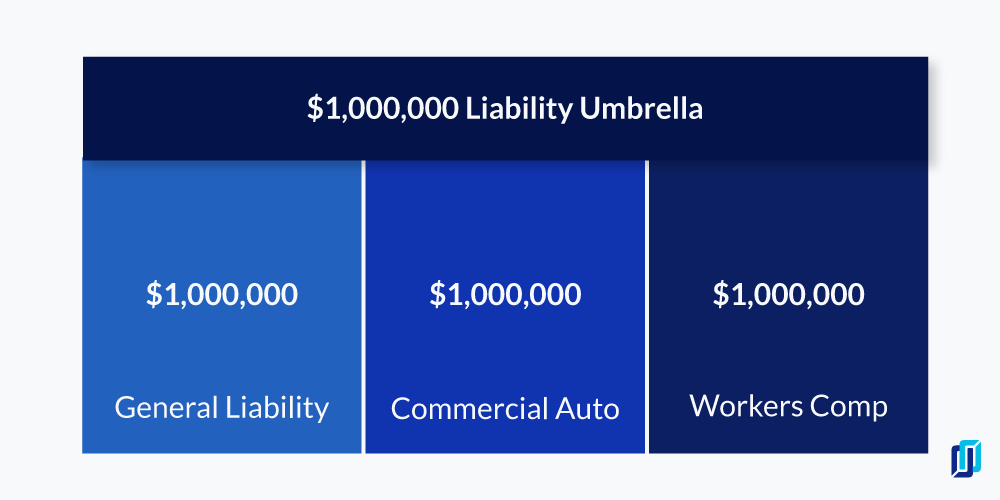
Contractors are required to purchase general liability and workers’ compensation insurance. However, some contracts may require more coverage than a contractor has acquired. When this occurs, contractors can bridge the gap with umbrella coverage. It extends other types of insurance to handle larger claims or multiple small claims that exceed the policy limit. Umbrella insurance is an affordable way to add coverage to existing liability policies.
Learn more: Do Contractors Need Liability Insurance?
What is umbrella insurance?
Umbrella insurance provides additional coverage in the event of a large claim that exceeds your current insurance limits. It extends coverage on general liability, auto, and other liability insurance policies.
So, if you have a claim that costs $2 million and only have $1 million in general liability insurance, an umbrella policy can pick up the remaining $1 million. Umbrella policies can save contractors money on large claims.
What does umbrella insurance cover?
Umbrella insurance policies cover claims that are covered by other liability insurance policies. Umbrella coverage will cover claims to your general liability insurance, auto insurance, and employers’ liability insurance. It covers large claims that are over your limit or multiple claims that put you over the limit. Umbrella coverage will pay the remaining balance not covered by your original policy.
Umbrella insurance is not sold as a standalone policy. You must purchase other insurance policies to qualify for an umbrella. It’s often grouped with general liability, auto, and employers’ liability in an insurance package.
Why contractors need umbrella insurance
There are many reasons contractors need additional coverage above the standard limits on their policies. Four reasons a contractor might need an umbrella policy are:
- A contract may require higher insurance limits (especially on larger projects).
- The contractor works on large projects where potential claims can be high
- If the contractor owns many assets, they may want to protect them affordably with umbrella insurance.
- If a contractor owns heavy equipment that travels on public roads, there’s a higher chance of large claims which can be covered by umbrella insurance.
How much does umbrella coverage cost?
The cost of an umbrella policy can depend on the amount of risk and the coverage amount desired. Construction is a pretty risky industry, but insurance is still affordable. The average cost of an umbrella policy is $750-$1,500 per year. That’s less expensive than adding additional coverage to primary liability policies, making umbrella insurance an affordable option for many contractors.

Examples of situations where umbrella insurance coverage is helpful
Example #1
A contractor is working on an unsecured construction site when someone wanders into the site and trips on a wooden glulam beam on the floor. The person is seriously injured and sues for bodily injury against the contractor’s general liability insurance. The court awards the person $2 million. The contractor’s general liability policy covers up to the policy limit of $1 million, while the commercial umbrella policy covers the additional $1 million.
Example #2
An employee of a masonry contractor is driving a truck with supplies to the construction site when he crashes into another vehicle, causing severe injuries to the other driver. The other party sues for $2 million in damages and wins the case. The masonry contractor’s commercial auto liability policy pays out the policy limit of $1 million, while their commercial umbrella insurance policy covers the remaining $1 million.
Example #3:
A general contractor buys employers’ liability insurance with a limit of $1 million. The contractor also purchases a commercial umbrella insurance policy to cover an additional $2 million. An employee is injured on the job and sues the company and wins a $1.5 million settlement. The employers’ liability insurance policy will pay out the limit of $1 million and the commercial umbrella insurance policy will cover the remaining $500,000. Without umbrella coverage, the contractor would have been responsible for the $500,000 that the employer liability insurance policy did not cover.
Contractors can extend their insurance coverage via an umbrella
Combined with general liability, auto, and employers’ liability insurance, umbrella insurance allows contractors to extend their coverage so they can take on larger projects or invest in more equipment and assets. It’s an extension of their current policies at an affordable rate.
Contractors should reach out to their insurance agent if they have any questions or wish to purchase umbrella coverage.
